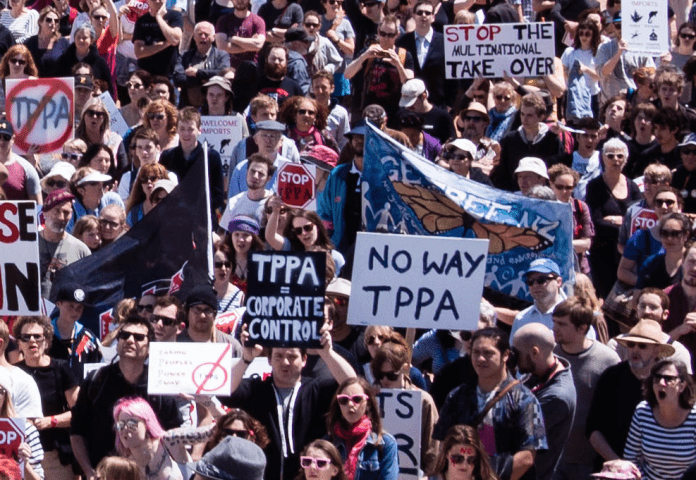The contentious trade deal is back with a bang, and the war launched by activists, and the local business community is not over in Malaysia.
This month, the Comprehensive and Progressive Agreement for Trans-Pacific Partnership (CPTPP) representatives will discuss whether the UK is joining the trade agreement.
The business community in the member countries expects the United States to make a U-turn on the deal.
The Americans under President Donald Trump pulled out of the TPP after outgoing President Barack Obama sealed the deal with the countries involved.
The newly-minted CPTPP was signed by 11 countries namely Australia, Brunei, Canada, Chile, Japan, Malaysia, Mexico, Peru, New Zealand, Singapore and Vietnam on March 8, 2018.
The CPTPP will only come into force when the countries concerned ratify the laws of their respective countries, each in line with the text of the agreement.
Malaysia is still in the process of evaluating the impact and benefits of the CPTPP and has not set a specific date for its ratification. The decision to ratify the deal now falls on the Cabinet.
But the movement against the ratification of the trade deal has unfinished business, and they are clawing back at the deal with the intent to rip it apart.
According to NurFitri Amir Muhammad, a researcher, social activist, and coordinator of the Malaysian Food Security and Sovereignty Forum, the CPTPP will not benefit the layman or the local communities.
“The agreement in many chapters (not only agriculture) put profit at the expense of national security, food security, environment, culture and wellbeing of the ordinary people.”
NurFitri says the countries like Singapore, one of the signatories, have nothing to lose because they have no local producers in agriculture that will be impacted by the rules and conditions imposed by the CPTPP.
“They need free trade to survive. Japan, Australia and Vietnam are agricultural exporters. They will lose out in the electronic and commodity sectors where Malaysia is also a major exporter.
But the question is who, in these countries including our country, will benefit from this agreement, he asks.
He notes there are other major redlines to look at. Access to generic medicine for ordinary people, technology transfer, and cultural and national issues like halal and the Bumiputera agenda are not discussed.
Although referred to as a “trade” agreement, only six of the 30 chapters in the text of the agreement are on conventional trade in goods.
The other 24 chapters contain rules and requirements in non-trade matters involving intellectual property, investment, government procurement, state-owned companies, e-commerce, services, environment and labour.
“This agreement will deeply affect the socioeconomic and socio-cultural fabric of Malaysia and there are provisions that will restrict, even prevent, Malaysia from introducing new policies if they conflict with the CPTPP,” says NurFitri.
He says in the context of agriculture, livestock and fisheries, the risk is quite large as Malaysia is not a major exporter of agro-food but of a commodity crop, namely palm oil.
“We need to learn from the North America Free Trade Agreement which saw the Mexican agricultural industry nearly destroyed due to dumping of agricultural products coming in from the United States and Canada as well as rising agricultural input costs due to monopolies created by stricter intellectual property protection,” he says to Business Today.
Meanwhile, the Intellectual Property Chapter which was one of the hotly contested chapters in the TPP obliges the member country to join several international agreements on intellectual property.
Among the agreements that will have a direct impact on farmers is the International Convention for the Protection of New Varieties of Plants (commonly known as UPOV91) and the Budapest Agreement related to patents on microorganisms.
NurFitry says In Malaysia, we already have the Protection of New Plant Varieties Act 2004 (PVP2004) which suits the agricultural situation in this country.
“Participation in the UPOV91 system will require the government to dissolve the PVP2004 and effectively prevent farmers from storing and sharing protected seeds, forming a market monopoly for 20 for a particular seed (25 years for vines and trees), and ultimately increasing seed prices.”
Besides the abolition of export subsidies, a requirement in the CPTPP, the texts require countries to remove 100% tariffs on imported goods including agricultural products.
Thus, Malaysia will face an increase in imports of agricultural products from other CPTPP countries.
In addition to tariffs, non-tariff import controls such as quotas and permits would also need to be eliminated to facilitate the entry of products from other CPTPP member countries.
Without tariffs and import controls, Malaysian farmers, breeders and fishermen will most likely not be able to compete with cheaper imports of agricultural products and food from other CPTPP countries especially Vietnam and Australia which also provide domestic subsidies to their farmers, breeders and fishermen.
The pro-CPTPP argument is that it has strong rules on subsidies, data flows, and labour or environment protection.









